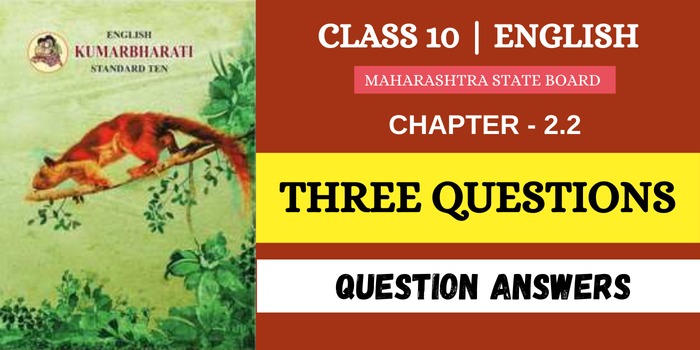
Maharashtra State Board Class 10 English Three Questions Important Question Answers from Kumarbharti Book
Three Questions Question Answers: Looking for Three Questions question answers for Maharashtra State Board class 10 English Kumarbharti Book? Look no further! Our comprehensive compilation of important questions will help you brush up on your subject knowledge. Practising Maharashtra State Class 10 English question answers can significantly improve your performance in the exam. Our solutions provide a clear idea of how to write the answers effectively. Improve your chances of scoring high marks by exploring Three Questions question answers now. The questions listed below are based on the latest exam pattern, wherein we have given solved exercises and question answers of the textbook and extra questions (Multiple Choice Questions and Vocabulary Based Questions).
Maharashtra State Board Class 10 English Kumarbharti Lesson Three Questions Textbook Questions
1. Expressions in English classified under different heads. Pair up with your partner, guess and match the columns. (Use a dictionary.)
| A | B | |
| (1) Principle | (a) | a generally accepted, evident, truth |
| (2) Quotation | (b) | short striking messages for the public |
| (3) Moral | (c) | a short witty remark stating the truth |
| (4) Idioms | (d) | a popular, well-known truth |
| (5) Slogans | (e) | established expressions which do not convey exactly the same as individual words |
| (6) One-liners | (f) | words cited from a speech/text of a famous person |
| (7) Maxims | (g) | a lesson derived from a story or experience |
| (8) Proverb | (h) | a rule to govern one’s behavior |
Answer-
| A | B | |
| (1) Principle | (h) | a rule to govern one’s behavior |
| (2) Quotation | (f) | words cited from a speech/text of a famous person |
| (3) Moral | (g) | a lesson derived from a story or experience |
| (4) Idioms | (e) | established expressions which do not convey exactly the same as individual words |
| (5) Slogans | (b) | short striking messages for the public |
| (6) One-liners | (c) | a short witty remark stating the truth |
| (7) Maxims | (d) | a popular, well-known truth |
| (8) Proverb | (a) | a generally accepted, evident, truth |
2. Read the polite requests/suggestions and complete the gaps in the responses. Make sure they are polite and not repeated.
| Could you lend me your dictionary? | Accept | (1) …………………………………….. |
| Refuse | (2) …………………………………….. | |
| Can you please pass the salad? | Accept | (1) …………………………………….. |
| Refuse | (2) …………………………………….. | |
| May I know the exact time? | Accept | (1) …………………………………….. |
| Refuse | (2) …………………………………….. | |
| Shall we plan a class-picnic? | Accept | (1) …………………………………….. |
| Refuse | (2) …………………………………….. | |
| Do you need help? | Accept | (1) …………………………………….. |
| Refuse | (2) …………………………………….. | |
| Is it alright if I use your laptop? | Accept | (1) …………………………………….. |
| Refuse | (2) …………………………………….. |
Answer-
| Could you lend me your dictionary? | Accept | (1) I’d be happy to lend it to you. |
| Refuse | (2) I’m afraid I’m currently using it, but I should be done soon. Would you like me to let you know when it’s free? | |
| Can you please pass the salad? | Accept | (1) Sure. |
| Refuse | (2) I apologize, it’s not within my reach. | |
| May I know the exact time? | Accept | (1) The time is __ pm. |
| Refuse | (2) My phone isn’t working right now, but maybe someone else can help. | |
| Shall we plan a class-picnic? | Accept | (1) Great idea! Maybe we can discuss some locations and dates. |
| Refuse | (2) It’s a nice thought, but I actually have a lot going on outside of school this week. Maybe another time? | |
| Do you need help? | Accept | (1) Yes, please. |
| Refuse | (2) That’s very kind of you to offer. I think I can manage for now, but thank you. | |
| Is it alright if I use your laptop? | Accept | (1) Sure, use it as long as you need. |
| Refuse | (2) I’m sorry, but I’m in the middle of something important right now. Would you be able to use the library computers instead? |
3. Let’s see if you remember a nursery rhyme you must have sung, as a kid :
Fill in the missing words :
‘The time to be happy is _____________________
The ___________________________ to be happy is here.
And the way to be ________________, is to ______________ someone happy
And have a little ________________________ right here !’
(happy, make, heaven, now, place)
Answer-
The time to be happy is now.
The place to be happy is here.
And the way to be happy is to make someone happy.
And have a little heaven right here!
What is the right time according to you?
Ans. The right time depends on the situation and your goals. Sometimes planning is essential, other times acting on opportunity is key.
What final suggestion did the last group of learned men offer, regarding the best time?
Ans. The last group of men shared that it was impossible for one man to decide correctly the right time for every action and that the king should, instead, have a council of wise people, who would help him to fix the proper time for everything.
Why did the king go to the hermit in disguise?
Ans. The king wore simple clothes and left his guards behind, to appear less like a king and gain access to the hermit who spoke only to common folk.
How did the hermit respond to the king’s questions?
Ans. The hermit initially ignored the questions and continued digging.
In what state was the bearded man, when he arrived?
Ans. The bearded man was in an injured state when he arrived. He then soon fainted
Why had the wounded man asked for the king’s pardon?
Ans. The wounded man realized the king had saved his life by treating his wound. He previously intended to kill the king but now felt indebted due to the act of kindness. He felt remorse for his past plan of revenge and wished to make amends.
What qualities of the king stand out as he forgave his enemy?
Ans. The king’s qualities that stand out as he forgave his enemy include:
- Compassion: The king showed compassion by treating his enemy’s wound despite being aware of his intentions.
- Forgiveness: He forgave the man’s past animosity and offered to help him further.
- Mercy: The king displayed mercy by not seeking revenge for the planned attack.
- Peacemaking: He chose peace by offering forgiveness and a chance for a new beginning.
How did the hermit finally point out the answers to the king’s questions?
Ans. The hermit didn’t directly answer the king’s questions with words. Instead, he used the events that unfolded to subtly reveal the answers.
By reminding the king that if he hadn’t helped dig the beds the previous day, he wouldn’t have been there to save the wounded man. This emphasises that the present moment is the most important because it shapes the future.
The hermit highlights the significance of the wounded man by pointing out that without tending to him, the man would have died. This emphasises that the person you’re interacting with holds the most importance in that moment.
The act of helping the wounded man, even though he was an enemy, ultimately led to peace. This subtly suggests that focusing on doing good in the present moment is the most important thing to do.
2. Read the story and answer whether the following statements are true or false.
(a) The people convinced the King to make a proclamation. ……………………………..
(b) The hermit spoke usually to everyone. ……………………………..
(c) The King received all answers from the hermit. ……………………………..
(d) The person the King saved and helped was his enemy. ……………………………..
(e) To do good to people is the purpose of our life. ……………………………..
Answer-
(a) The people convinced the King to make a proclamation. True
(b) The hermit spoke usually to everyone. False
(c) The King received all answers from the hermit. False
(d) The person the King saved and helped was his enemy. True
(e) To do good to people is the purpose of our life. True
2. Match the titles with the contents of the proper paragraph.
| 1 | Once a certain king . . . important to do. | a | King gains a friend. |
| 2 | Many learned people . . . time for everything. | b | The wounded stranger |
| 3 | Equally varied . . . gave the reward to none. | c | King helps the hermit. |
| 4 | When the King arrived, . . . my first attention. | d | The stranger begs for pardon. |
| 5 | The hermit listened . . . continued to dig. | e | The hermit points out answers. |
| 6 | The King turned around . . . gave it to him. | f | Stranger’s vicious intention |
| 7 | Meanwhile the sun . . . said the King. | g | Questions remain unanswered. |
| 8 | “You do not know … all my life. | h | The king received various answers. |
| 9 | The King was very glad . . . the day before. | i | King’s announcement. |
| 10 | “Do you not see?” . . . sent into this life!” | j | The King meets the hermit. |
Answer-
| 1 | Once a certain king . . . important to do. | i | King’s announcement. |
| 2 | Many learned people . . . time for everything. | h | The king received various answers. |
| 3 | Equally varied . . . gave the reward to none. | g | Questions remain unanswered. |
| 4 | When the King arrived, . . . my first attention. | j | The King meets the hermit. |
| 5 | The hermit listened . . . continued to dig. | c | King helps the hermit. |
| 6 | The King turned around . . . gave it to him. | b | The wounded stranger |
| 7 | Meanwhile the sun . . . said the King. | d | The stranger begs for pardon. |
| 8 | “You do not know … all my life. | f | Stranger’s vicious intention |
| 9 | The King was very glad . . . the day before. | a | King gains a friend. |
| 10 | “Do you not see?” . . . sent into this life!” | e | The hermit points out answers. |
3. The character traits of the king and hermit are mixed up. Sort them out in the right box.
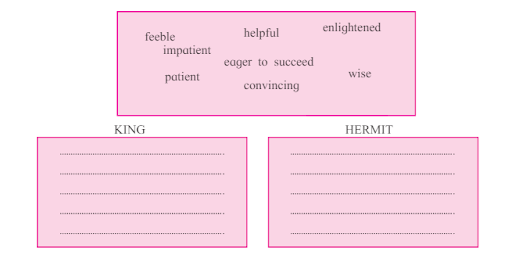
Answer-
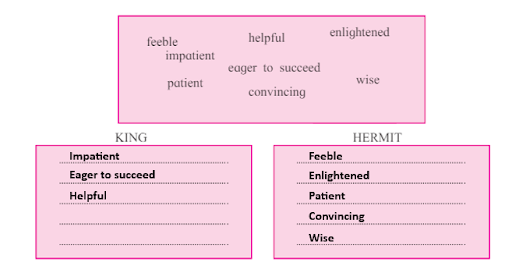
4. Complete the Tree diagrams associated with the happenings in the story.
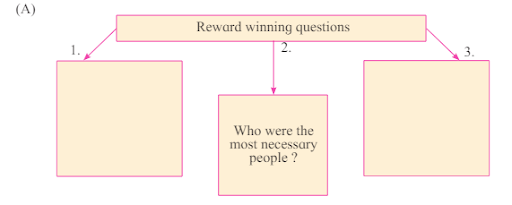
Answer-
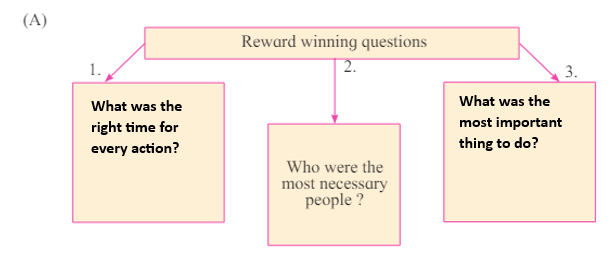
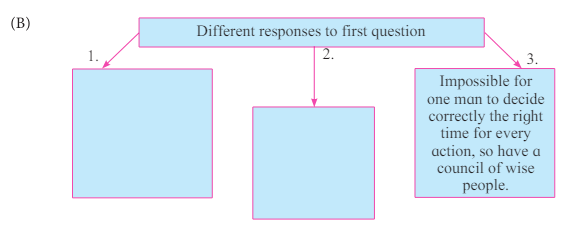
Answer-
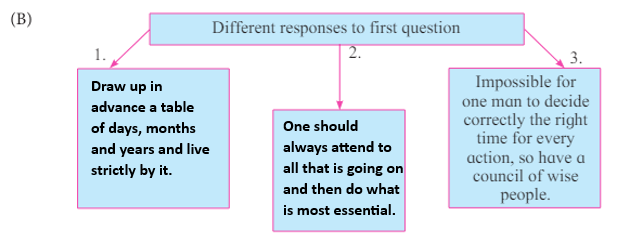
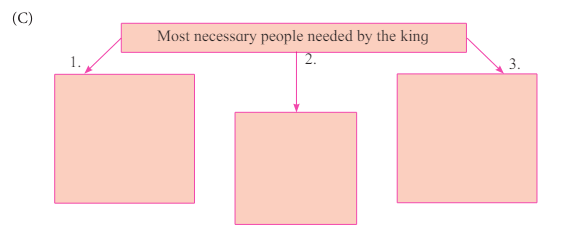
Answer-
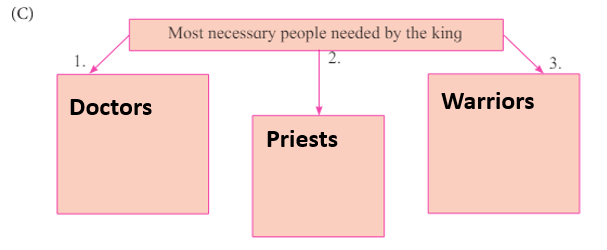
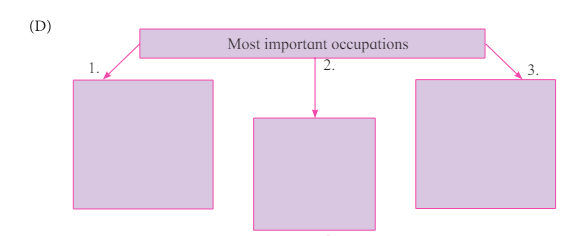
Answer:
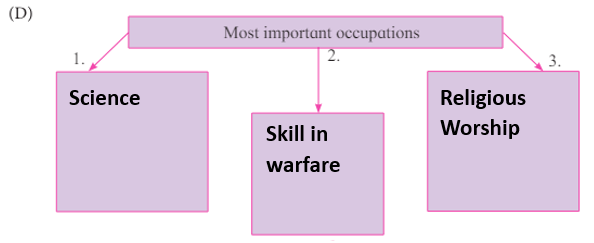
5. Write down in your notebook two points for each of the following. How do you know . . .
(a) the learned advisers who came to the court confused the king.
(b) the king was humble.
(c) the king’s enemy was repentant.
(d) the hermit was truly wise.
Answer-
(a) the learned advisers who came to the court confused the king.
- None of the advisers could give satisfactory answers to the king’s three questions.
- All of them had conflicting answers as they were not sure.
(b) the king was humble.
- The King did not mind doing ordinary work such as digging.
- The King did not use his authority as king to force the hermit to answer his questions. Instead he requested the hermit politely and was ready to go away if the hermit refused to answer his questions.
(c) the king’s enemy was repentant.
- He asked for forgiveness when he got to know that the king himself helped to revive him.
- He offered to be king’s servant and he even said that his son will be king’s servant because he wanted to show the king that he was really grateful to him.
(d) the hermit was truly wise.
- Nothing of importance escaped his consideration and answered the king’s questions in a real and practical way.
- The hermit dealt with the plan of the king’s enemy purposefully.
6. Choose the correct answer.
(a) “Varied” (Paragraph-3) means ……………………
(i) different (ii) unnecessary (iii) unequal (iv) unimportant.
Ans. (a) different
(b) Many learned people came to the court and gave ……………………
(i) The same answers (ii) correct answers (iii) different answers (iv) wrong answers.
Ans. (iii) different answers
(c) The synonym of ‘convinced’ is ……………………
(i) persuaded (ii) happy (iii) unhappy (iv) angry.
Ans. (i) persuaded
(d) The King wanted to know the …………………… time to begin everything.
(i) right (ii) exact (iii) proper (iv) good.
Ans. (i) right
(e) ‘‘I pray you to answer my question.’’ Here ‘pray’ means ……………………
(i) plead to God (ii) request (iii) order (iv) suggest.
Ans. (ii) request
(f) Choose an adverb that collocates with “breathed ……………………
(i) hurriedly (ii) heavily (iii) hardly (iv) calmly.
Ans. (ii) heavily
7. Answer the following questions.
(a) The learned people were sometimes divided in their opinions, different persons giving quite different answers; at other times, none of them gave an answer. They all suggested ways to look for an answer. Point out one example of each.
Ans. What is the right time to begin something?
- Some scholars suggested creating a strict schedule for every action (days, months, years).
- Others believed the right time depended on constantly being aware of current events and acting accordingly.
The people the king most needed- Councillors, Doctors, Warriors.
The most important occupation: Science, Warfare, Religious Studies.
(b) Though the hermit did not say anything to the king for some time, he did not ignore the king or treat him rudely in any way. Do you agree? What evidence of his politeness can you point out ? What shows that he listened and responded to the king’s words?
Ans. I agree completely. The hermit, despite his silence initially, displayed politeness towards the king. His politeness is evident by the fact that he greeted the king. By spitting on his hand before he resumed digging, the hermit indicated that the work he was doing was more important and that the king would have to wait.
(c) The hermit ‘spoke only to common people’; so the king ‘put on simple clothes’. Do you think the king hoped to be mistaken for a common man, or was he just showing that he was a humble person? What shows that the hermit knew him to be the king?
Ans. The king put on simple clothes because he did not want the hermit to refuse to answer his questions. The king was aware that the hermit was wise and would know that he was the king and not mistake him for a common person. Dressing down could symbolize a willingness to approach the situation with an open mind, shedding his royal status to learn about life.
(d) Did the king behave as an ordinary person, rather than as a ruler, at the hermit’s hut? What shows it? Did he also act as a good, kind person? When did he do so?
Ans. Yes, the king acted like an ordinary person. He disguised himself, helped with chores, and waited patiently. His kindness shone through when he cared for the wounded man. These actions highlight the king’s good nature and ability to set aside his royal status to help those in need.
(e) Do you think the hermit knew, beforehand, not only about the king’s arrival but about the ambush by his enemy? Think a little about this and say what you really feel.
Ans. I think the hermit somehow knew everything before the king arrived.
The hermit’s actions – tending the garden (representing constant work) and treating the wounds of the injured man (representing helping people) – perfectly mirrored the answers he would later give the king. This timing suggests premeditation.
8. Consider this list of the different things that happened and rearrange them in the order of time, that is, what happened first, what happened next and so on. Read the related paragraph again if you are uncertain.
(a) The bearded man resolved to kill the king.
(b) The king went alone to see the hermit.
(c) The king executed the bearded man’s brother.
(d) The king spent the night at the hermit’s hut.
(e) The bearded man laid an ambush to kill the king.
(f) The king’s bodyguards recognised and wounded the bearded man.
(g) The bearded man came out of the ambush.
Answer-
(b) The king executed the bearded man’s brother.
(a) The bearded man resolved to kill the king.
(c) The bearded man laid an ambush to kill the king.
(e) The bearded man came out of the ambush.
(d) The king’s bodyguards recognised and wounded the bearded man.
(f) The king spent the night at the hermit’s hut.
(g) The king went alone to see the hermit.
9. Read the story in your own language, summarize the following aspects of the story in 4 to 5 lines each in your own language. Write it in your notebook.
(a) King’s problem : ………………………………………………………………
(b) Attempts made to find a solution : ………………………………………………………………
(c) Climax : ………………………………………………………………
(d) Solution : ………………………………………………………………
(e) Message : ………………………………………………………………
Answer-
(a) The King’s problem was that he wanted someone from his kingdom to give him the answers to three questions.
(1) What was the right time to begin everything?
(2) Who are the right people to listen to?
(3) What was the most important thing to do?
(b) In order to find a solution, the king sent out messengers to find wise people, promising rewards for the answers
(c) Disappointed, the king sought a hermit known for wisdom. At the hermit’s secluded hut, the king witnessed the hermit helping a wounded man and then chasing after a thief who stole the hermit’s horse.
(d) The hermit never directly answered the king’s questions. However, by living in the present moment, helping the injured man (most important thing), and prioritizing the immediate need to retrieve the stolen horse (right time, right people), the hermit indirectly showed the king the answers.
(e) The story suggests that true wisdom lies in focusing on the present, acting with kindness and good judgment in each situation, rather than seeking grand pronouncements about the future or the ultimate purpose.
10. (A) The following compound words from the story are spelt in a jumbled order. Rearrange the letters to make them meaningful.
(1) a r e e t u k d n = ………………………………………………………
(2) y o n n a e = ………………………………………………………
(3) s t a p s i e m = ………………………………………………………
(4) d u b g y r o a d = ………………………………………………………
(5) f r a w e r a = ………………………………………………………
(6) h e e d a r f o n b = ………………………………………………………
(7) h e i l n e w a m = ………………………………………………………
(8) n e v h i g r e t y = ………………………………………………………
Answer-
(1) a r e e t u k d n = undertake
(2) y o n n a e = envoy
(3) s t a p s i e m = pastimes
(4) d u b g y r o a d = bodyguard
(5) f r a w e r a =
(6) h e e d a r f o n b = beforehand
(7) h e i l n e w a m = meanwhile
(8) n e v h i g r e t y = everything
(B) From the story, find the collocations of the following.
(1) …………………… important.
(2) …………………… intently
(3) frail and ……………………
(4) widely ……………………
(5) …………………… time
(6) …………………… blood
(7) simple ……………………
(8) closed ……………………
(9) …………………… asleep
(10) …………………… peace
(11) took ……………………..
Answer-
(1) most important
(2) gazing intently
(3) frail and weak
(4) widely renowned
(5) right time
(6) warm blood
(7) simple clothes
(8) closed eyes
(9) fell asleep
(10) made peace
(11) took leave
11. Say whether the Verbs underlined in the sentences are finite (limited by the number or person of the subject) or non-finite (not governed by the subject, number or person).
(1) He decides to go to a hermit.
(2) I have come to you, wise hermit.
(3) He gave the reward to none.
(4) The hermit was digging the ground.
(5) I pray you to answer my questions.
(6) ‘‘Forgive me.’’
(7) The sun began to sink.
Answer-
(1) decides – finite; to go – non-finite.
(2) have come – finite; to ask, to answer-non- finite.
(3) gave – finite; This sentence has no non-finite verb.
(4) was – finite; digging – non-finite.
(5) pray – finite: to answer – non-finite
(6) forgive – finIte
(7) began – finite; to sink – non-finite.
12. Narrate an experience of your own that has helped you to realise that ‘Patience is bitter, but its fruit is sweet.’ Write it in your notebook, in about 20 lines.
Answer-
This year, I decided to crack the NTSE scholarship exam. Everyone said it was tough, and studying for it felt like climbing Mount Everest. I went through countless practice papers, revising topics I just couldn’t seem to grasp. There were days when I wanted to quit it all – frustration was my constant companion.
But then I remembered what Nani says, “Sabr ka phal mitha hota hai” (Patience is bitter, but its fruit is sweet). So I kept going. Slowly, things started to click. I aced my mock tests, and a sense of calm replaced the earlier panic.
Finally, the exam day arrived. I went in feeling confident, a result of all those patient hours. And guess what? I passed. The sweetness of success washed away all the bitterness of studying. Now, looking back, I realize that patience wasn’t just about the exam. It’s a life lesson – a reminder that hard work and patience always pays off in the end.
13. After reading this story, develop a dialogue with 2 of your classmates about the characters in the story. Besides the tactful introduction to the conversation and write 8 to 10 sets of dialogues.
Answer- Setting: Lunch break at school canteen. Three friends – Maya, Rohan, and Akash – are eating their lunch.
Maya: Hey guys, did you all finish reading “The Three Questions” for literature class?
Rohan: Yeah, just finished it this morning. What a strange story.
Rohan: So, the king had all these wise advisors, but none of them could give him a good answer.
Maya: Yeah, they just gave him confusing advice that made things worse.
Akash: Maybe that’s part of the point. Sometimes, too much advice can cloud your judgment.
Maya: True. Maybe the best thing is to learn to think for yourself and make your own decisions.
Rohan: Speaking of decisions, what do you think about the king deciding to follow the hermit after all that happened?
Akash: Maybe seeing the hermit’s actions firsthand made him realize the value of the hermit’s wisdom more than just hearing words.
Maya: Yes, and maybe the king finally understood that the answers he was looking for weren’t some grand pronouncements, but a way of approaching life.
Rohan: So, the story isn’t really about the three questions themselves, but about how the king learned to answer them himself?
Maya: Exactly! It’s about the journey of learning to be a wise ruler, not just having all the answers.
14. From the library or Internet, read the story ‘How much land does a man need?’ by Leo Tolstoy and write a review of the same, covering the following points.
- Background of the story
- Characters
- Plot/Theme
- Climax
- Message/Moral
Answer-
Background – “How Much Land Does a Man Need?” is a short story written by Leo Tolstoy in 1886. It is a classic of Russian literature and explores themes of greed, human nature, and the pursuit of material wealth. It is a timeless tale that continues to resonate with readers today, urging people to reflect on our own values and priorities.
Characters –
Pahóm: The protagonist, a peasant who is never satisfied with the amount of land he owns. He is initially content with his small plot but becomes consumed by the desire for more land.
The Devil: A mysterious figure who tempts Pahóm with the promise of limitless land.
The narrator: An unnamed observer who recounts Pahóm’s story.
Plot/Theme – The story revolves around Pahóm, a peasant who feels restricted because of his small amount of land. He hears a rumor about a place where a man can acquire as much land as he can walk around in a single day. Consumed by greed, Pahóm travels to this place and makes a deal with a shadowy figure who some readers interpret as the Devil.
Pahóm successfully claims a large amount of land, but his desire grows further. He attempts to claim even more land, pushing himself to his physical limits. In a tragic twist, Pahóm tires himself and dies after claiming just a small additional plot – enough to bury him.
The central theme of the story is the dangers of greed and the insatiable nature of human desire. It explores how the pursuit of material wealth can ultimately lead to emptiness and destruction.
Climax – The climax occurs when Pahóm attempts to claim an even larger piece of land. He pushes himself beyond his physical limits, running frantically to mark the boundaries before sunset. This relentless pursuit leads to his collapse and eventual death.
Message/Moral – The story’s message is a stark warning against greed. It reminds us that true happiness cannot be found in the accumulation of material possessions. Instead, the story suggests that contentment and a sense of fulfillment come from living simply and appreciating what we already have.
Maharashtra State Board Class 10 English Kumarbharti Chapter The Three Questions Extra Questions
1. Complete the following table.
(Who said to whom and why)
| Statement | Who said | To whom | Why | |
| 1. | “You have already been answered!” | The Hermit | The King | The hermit believes the king already has the answers to his questions through his experiences in the previous day (helping the hermit and tending to the wounded man). |
| 2. | Remember then, there is
only one time that is important-now! It is the most important time because it’s the only time when we have any power. |
………………. | ………………. | ………………. |
| 3. | “Forgive me!” | ………………. | ………………. | ………………. |
| 4. | “You do not know me, but I know you.” | ………………. | ………………. | ………………. |
| 5. | “I do not know you, and I’ve nothing to forgive you for,” | ………………. | ………………. | ………………. |
| 6. | “You are tired, let me
take the spade and work a while for you.” |
………………. | ………………. | ………………. |
| 7. | “Now rest a while and let me work a bit”. | ………………. | ………………. | ………………. |
| 8. | “Here
comes someone running, let us see who it is.” |
………………. | ………………. | ………………. |
| 9. | “I came to you, wise
one, for an answer to my questions” |
………………. | ………………. | ………………. |
| 10. | “If you can give
me none, please say so, and I will go home”. |
………………. | ………………. | ………………. |
Answer-
| Statement | Who said | To whom | Why | |
| 1. | “You have already been answered!” | The Hermit | The King | The hermit believes the king already has the answers to his questions through his experiences in the previous day (helping the hermit and tending to the wounded man). |
| 2. | Remember then, there is
only one time that is important-now! It is the most important time because it’s the only time when we have any power. |
The Hermit | The King | The hermit explains how the king’s seemingly unimportant actions helping him and the wounded man were actually the most important things he could have done at those moments. |
| 3. | “Forgive me!” | The bearded man | The king | The bearded man is apologizing to the king for wanting to kill him. |
| 4. | “You do not know me, but I know you.” | The bearded man | The king | The bearded man is revealing his identity and motive for wanting to kill the king. |
| 5. | “I do not know you, and I’ve nothing to forgive you for,” | The King | The bearded man | The confused king said this because he doesn’t recognize the bearded man. |
| 6. | “You are tired, let me
take the spade and work a while for you.” |
The King | The Hermit | The king says this as he is feeling sorry for the hermit’s struggle, and thus, offers to help him dig. |
| 7. | “Now rest a while and let me work a bit”. | The Hermit | The King | Seeing the king tired and frustrated, the hermit stretches his hands to ask for the spade and then says this. |
| 8. | “Here
comes someone running, let us see who it is.” |
The hermit | The King | The hermit sees a stranger and asks the king to accompany him. |
| 9. | “I came to you, wise
one, for an answer to my questions” |
The King | The Hermit | The King wants answers to the life questions that he is seeking from the hermit. |
| 10. | “If you can give
me none, please say so, and I will go home”. |
The King | The Hermit | The King expresses frustration and is willing to leave if the hermit won’t provide the answers that the king is seeking. |
2. Multiple-Choice Questions
1. Why did the king make a proclamation throughout his kingdom?
(a) He wanted to find a new cook.
(b) He was bored and wanted entertainment.
(c) He believed knowing certain things would ensure success.
(d) He was looking for new advisors.
2. How did the learned people respond to the king’s first question about the right time for every action?
(a) They all agreed on a single answer.
(b) They suggested creating a schedule for all actions.
(c) They advised following current events to decide the time.
(d) Both b and c
3. What disagreement arose concerning the second question about the most important people to listen to?
(a) Everyone agreed it was the king’s advisors.
(b) There was a consensus that it was the priests.
(c) There were various suggestions like priests, doctors, and warriors.
(d) The answer focused on the importance of listening to everyone.
4. Why did the king travel to the hermit?
(a) To learn about warfare skills
(b) To get answers to three important questions
(c) To discuss religious matters
(d) To offer the hermit help
5. How did the king help the hermit?
(a) He offered him money.
(b) He offered him advice.
(c) He dug the beds for him.
(d) He sent his bodyguard to help.
6. Why did the bearded man want to kill the king?
(a) Because the king was a bad ruler.
(b) Because the king had saved his life.
(c) Because the king had executed his brother and seized his property.
(d) Because the king was visiting the hermit.
7. How did the king help the bearded man?
(a) He gave him food and water.
(b) He dressed his wound.
(c) He called for a physician.
(d) He offered him shelter.
8. What happened after the king helped the bearded man?
(a) The bearded man remained an enemy of the king.
(b) The bearded man offered to kill the king’s enemies.
(c) The bearded man apologized and offered to serve the king.
(d) The bearded man stole the king’s belongings and fled.
9. According to the hermit, why were we sent into this life?
(a) To gain power and knowledge.
(b) To rule with justice and fairness.
(c) To do good for others.
(d) To find the answers to life’s biggest questions.
10. Who is the author of the story “The Three Questions”?
(a) Leo Rosten
(b) Leopoldo Alas Mórales
(c) Leo Buscaglia
(d) Leo Tolstoy
Answers-
- (c) He believed knowing certain things would ensure success.
- (d) Both b and c
- (c) There were various suggestions like priests, doctors, and warriors.
- (b) To get answers to three important questions
- (c) He dug the beds for him.
- (c) Because the king had executed his brother and seized his property.
- (b) He dressed his wound.
- (c) The bearded man apologized and offered to serve the king.
- (c) To do good for others.
- (d) Leo Tolstoy
3. Vocabulary Based MCQs
1. Equally varied were the answers to the second question. What is a synonym for “varied”?
(a) Similar
(b) Confusing
(c) Diverse
(d) Precise
2. Many learned people came to the court to answer the king’s questions. What is another word for “learned”?
(a) Powerful
(b) Wealthy
(c) Wise
(d) Uneducated
3. The king had a proclamation made throughout his kingdom. What is the closest meaning of “proclamation”?
(a) A secret message
(b) A public announcement
(c) A personal request
(d) A formal agreement
4. The king put on simple clothes and approaching the hermit’s cell, dismounted his horse and left his bodyguard behind. The word “dismounted” most likely means:
(a) Got on his horse.
(b) Got off his horse
(c) Tied up his horse.
(d) Fed his horse.
5. The hermit was frail. The word “frail” describes the hermit as:
(a) Strong and healthy.
(b) Angry and frustrated.
(c) Loud and boisterous.
(d) Weak and delicate.
6. The strange bearded man lying by his side and gazing intently at him. An antonym for “intently” would be:
(a) Absentmindedly
(b) Scrutinizing
(c) Observing
(d) Examining
7. “You have already been answered!” said the hermit still crouching on his thin legs and looking up at the king who stood before him. What is the closest antonym for “crouching” in this context?
(a) Kneeling
(b) Standing
(c) Stooping
(d) Hunching
8. You executed his brother and seized his property. What is the closest antonym for “seized” in this context?
(a) Claimed
(b) Confiscated
(c) Relinquished
(d) Inherited
9. When he reached the king, he fainted and fell to the ground, moaning feebly. What is the closest antonym for “feebly” in this context?
(a) Loudly
(b) Silently
(c) Quietly
(d) Faintly
10. When at last the blood stopped flowing, the man revived and asked for something to drink. What is the closest synonym for “revived” in this context?
(a) Died
(b) Fainted
(c) Regained consciousness
(d) Slept soundly
Answer-
- (c) Diverse
- (c) Wise
- (b) A public announcement
- (b) Got off his horse
- (d) Weak and delicate.
- (a) (a) Absentmindedly
- (b) Standing
- (c) Relinquished
- (a) Loudly
- (c) Regained consciousness